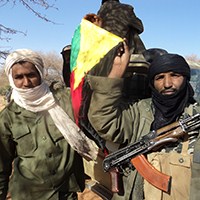
A group of Tuareg rebels in northern Mali, whose rebellion against the central government sparked a coup and eventually a French intervention, announced yesterday that they were backing out of a June 2013 peace agreement with the Malian government. The move is a step backward for the efforts to stitch Mali back together again. But as Kamissa Camara wrote in WPR earlier this month, the agreement put on hold yesterday was problematic to begin with: Mali’s central government has signed a series of peace agreements with Tuareg rebels over the years, but they have only served short-term purposes. The latest […]




